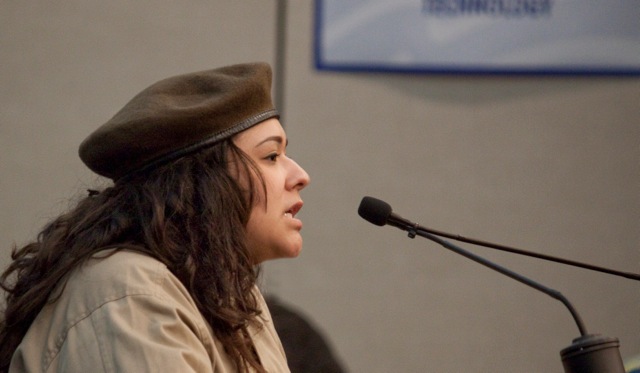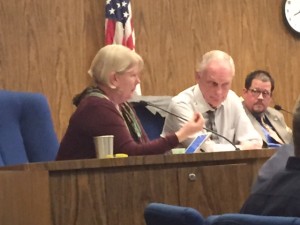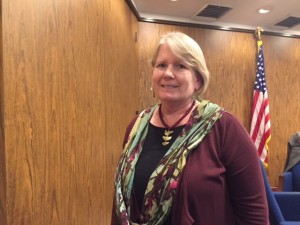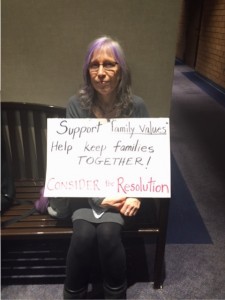by Leslie Layton
In part, it was the 4-3 vote against merely considering their request that surprised and frustrated college students, and that moved some of them to booing before they left the Council Chamber.
In part, it was the way the vote was taken – swiftly and without explanation – that stunned or offended some community members. On Tuesday, an audience that filled the chamber asked the Chico City Council to consider at an upcoming meeting a sanctuary policy that would help protect the local immigrant community and its relationship with police.

Cassandra Hernandez told the council, “We’re not numbers. We’re actual people.”
The sanctuary issue was addressed at 9 p.m., three hours after the meeting had begun. It had come as “business from the floor,” and there it stayed – as business on the floor. The council’s vote had unceremoniously ended what Councilwoman Ann Schwab called an extraordinary “outpouring.”
“In my 12-plus years on the council, I have never seen such an outpouring of sentiment and some very powerful words,” said Schwab, as she moved to place the sanctuary matter on an upcoming meeting agenda, a motion that would fail.
Sanctuary status — like that which has been adopted by other California cities — could shield Chico police from involvement in federal immigration law enforcement as the Trump administration ratchets up deportations. A sanctuary or compassionate city designation would provide at the least a philosophical welcome to diversity and at the most, a policy statement. Requests had come from student organizations, out of conversations on social-media networks and from Chico’s Lin Jensen, a retired college instructor and practicing Buddhist.
“I ask you all to please support our sanctuary town proposal,” said Lorena Magadaleno, who identified herself as an undocumented Chico State student as she addressed the council in a trembling voice. “It means a lot to a lot of people here in town. It takes a lot of courage to be up here in front of you, telling you my status. I’m clearly shaking right now, but that’s ok, because there are a lot of people out there who are supporting us.”
Magdaleno then asked everyone in the chamber who supported the sanctuary concept to stand, and most of the audience did. After 37 people spoke in favor of sanctuary, came Schwab’s motion, then votes in favor from councilmen Randall Stone and Karl Ory. The motion failed when it was opposed by Mayor Sean Morgan, Vice Mayor Reanette Fillmer and councilmen Mark Sorensen and Andrew Coolidge.

Council members Ann Schwab, Karl Ory and Randall Stone voted to agendize sanctuary.
Morgan had not returned calls asking for comment when this story was posted.
Peter Washington, an attorney who told the council he favored a sanctuary policy, said later that a discussion would have been good for the community.
“I wasn’t terribly surprised by how they voted,” Washington said in a Wednesday telephone interview, “but I was most disappointed that four of our seven councilors had apparently made up their minds that this proposal was not a good one. They may have had good reasons, but their vote not to discuss this means we’ll never get to hear them.”
Washington said he’s had clients who were moved into the federal immigration system at the conclusion of a local court case. But he has no idea how Immigration and Customs Enforcement (ICE) becomes aware of the cases. “I’m frankly unaware of how ICE may or may not be notified,” he told ChicoSol.
The question of collaboration with ICE is particularly crucial as President Trump works to involve local police agencies in immigration law enforcement. Trump wants to reinstate programs like Secure Communities that ended in November 2014. Under Secure Communities, county jails forwarded the fingerprints of their inmates to ICE and sometimes held them for pick up. Critics of the program said it damaged relationships between local immigrant communities and their law enforcement agencies.
In comments to ChicoSol after the meeting, Chico Police Chief Michael O’Brien indicated that he views sanctuary as a non-issue. “We arrest, without respect to immigration status,” O’Brien said. “It’s never been an issue. We enforce laws independent of national status.”
But many community members, like Rocio Guido, an adult education instructor, want to know more: Whether there are ICE notifications, jail holds or other forms of collaboration. After speaking in favor of sanctuary, Guido asked the council to “make public the protocol, how [police] deal with minor or bigger crimes, what happens when you encounter someone who is undocumented.”
The Immigration Legal Resource Center says city policies can explicitly state that local resources won’t be spent on enforcement of federal law. But it also says that sanctuary policies are most effective when they’re also implemented at the county level.
Attorney Washington said he’s been involved in cases where the clients, witnesses or victims were undocumented. “I would hate to see our law enforcement saddled with the burden of investigating crimes when people are afraid of calling them,” he told the council.
Later, Washington told ChicoSol: “I don’t think the local police should be defiant of federal authorities. But local police have a lot to do to keep our community safe. The climate of fear we’re seeing will increase reluctance [by some communities] to interact with law enforcement, especially in cases of domestic violence.”
It was that climate of fear that people like Asa Mittman hoped the City Council would acknowledge. Mittman, chair of Chico State’s art history department, said he became so upset by Trump’s immigration policies that he began researching sanctuary policy and contacted the council members.

Councilwoman Ann Schwab made the motion for discussion
He said Schwab was the only one to respond. And as student groups began to organize, Mittman and Schwab acted as guides when needed. “We want to show that there are good and decent members of our community who are feeling imperiled and afraid,” Mittman said prior to addressing the council.
As the students lolled in the chamber waiting area early in the meeting, some discussed their fears with ChicoSol. One student worries about her undocumented mother and what will happen if she’s stopped for a minor traffic violation. Another worries about his tenuous status on the Deferred Action for Childhood Arrivals program and whether he should finish his engineering degree. A few students worry about being deported to countries they barely know.
The day after the meeting, Councilman Randall Stone sent ChicoSol a statement by email. It states in part: “Last night I was floored by the unwillingness of our Council majority to even *discuss* the concerns of our community members. There was no discussion about the no vote at all. It was swift and unwarranted. At a minimum, the Council could have asked for data and discussion on our local government’s roles and responsibilities in this new environment…
“There were a lot of devastated and scared faces at last night’s meeting. If that’s where we leave it I’ll be extremely disappointed.”

Susan Sarnoff, retired kindergarten teacher supporting a sanctuary resolution
Some of the students left the meeting in tears, saying the council had failed to acknowledge their concerns. They regrouped in meetings on campus today, as did community groups affiliated with Mobilize Chico.
Katie Peterson, program coordinator of the Cross-Cultural Leadership Center at Chico State, said that students were heartened at the City Council meeting by the presence of supportive community members representing a diversity of age groups and professions. But she said they nevertheless came away with the sense that some “really do have a blatant disregard for their lives.”
Peterson said she wasn’t prepared to be specific but “there are going to be additional efforts going forward.”
Immediately following the meeting, William Mendoza, president of the Chico State La Raza Student Union, said he was disappointed but not defeated.
“We didn’t get to hear their reasons and they don’t want to hear the truth,” Mendoza said. “But the fight will never stop.”

This is the best coverage I’ve seen about the issue. Thanks Leslie!
What is the next step? This cannot be finished. we must support our community members; families, college students, children; whose unique contributions and diversity make us the rich community that we are.